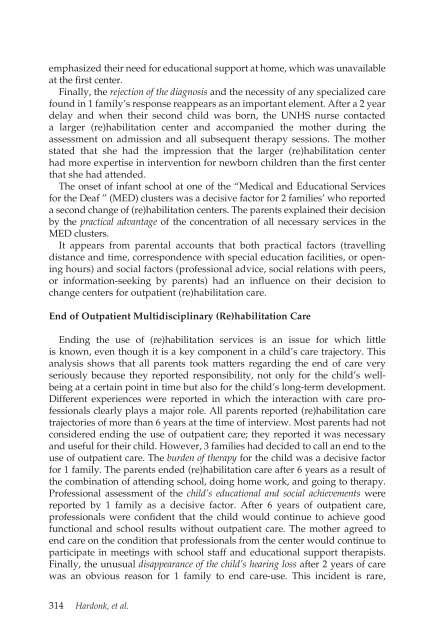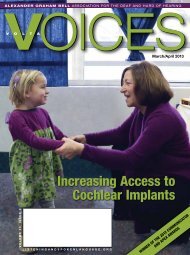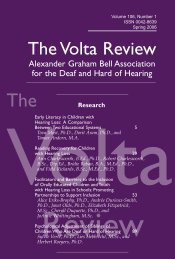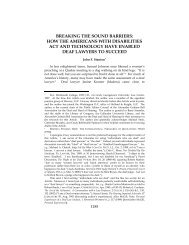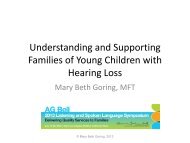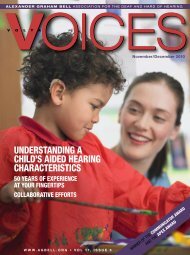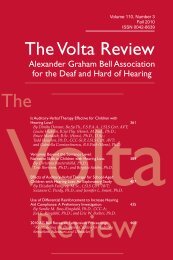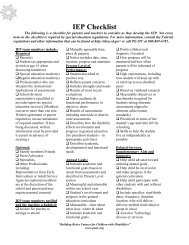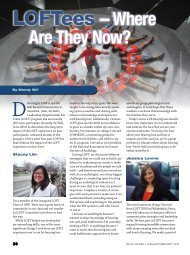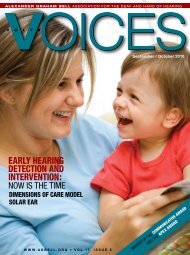The Volta Review - Alexander Graham Bell Association
The Volta Review - Alexander Graham Bell Association
The Volta Review - Alexander Graham Bell Association
Create successful ePaper yourself
Turn your PDF publications into a flip-book with our unique Google optimized e-Paper software.
emphasized their need for educational support at home, which was unavailable<br />
at the first center.<br />
Finally, the rejection of the diagnosis and the necessity of any specialized care<br />
found in 1 family’s response reappears as an important element. After a 2 year<br />
delay and when their second child was born, the UNHS nurse contacted<br />
a larger (re)habilitation center and accompanied the mother during the<br />
assessment on admission and all subsequent therapy sessions. <strong>The</strong> mother<br />
stated that she had the impression that the larger (re)habilitation center<br />
had more expertise in intervention for newborn children than the first center<br />
that she had attended.<br />
<strong>The</strong> onset of infant school at one of the “Medical and Educational Services<br />
for the Deaf ” (MED) clusters was a decisive factor for 2 families’ who reported<br />
a second change of (re)habilitation centers. <strong>The</strong> parents explained their decision<br />
by the practical advantage of the concentration of all necessary services in the<br />
MED clusters.<br />
It appears from parental accounts that both practical factors (travelling<br />
distance and time, correspondence with special education facilities, or opening<br />
hours) and social factors (professional advice, social relations with peers,<br />
or information-seeking by parents) had an influence on their decision to<br />
change centers for outpatient (re)habilitation care.<br />
End of Outpatient Multidisciplinary (Re)habilitation Care<br />
Ending the use of (re)habilitation services is an issue for which little<br />
is known, even though it is a key component in a child’s care trajectory. This<br />
analysis shows that all parents took matters regarding the end of care very<br />
seriously because they reported responsibility, not only for the child’s wellbeing<br />
at a certain point in time but also for the child’s long-term development.<br />
Different experiences were reported in which the interaction with care professionals<br />
clearly plays a major role. All parents reported (re)habilitation care<br />
trajectories of more than 6 years at the time of interview. Most parents had not<br />
considered ending the use of outpatient care; they reported it was necessary<br />
and useful for their child. However, 3 families had decided to call an end to the<br />
use of outpatient care. <strong>The</strong> burden of therapy for the child was a decisive factor<br />
for 1 family. <strong>The</strong> parents ended (re)habilitation care after 6 years as a result of<br />
the combination of attending school, doing home work, and going to therapy.<br />
Professional assessment of the child’s educational and social achievements were<br />
reported by 1 family as a decisive factor. After 6 years of outpatient care,<br />
professionals were confident that the child would continue to achieve good<br />
functional and school results without outpatient care. <strong>The</strong> mother agreed to<br />
end care on the condition that professionals from the center would continue to<br />
participate in meetings with school staff and educational support therapists.<br />
Finally, the unusual disappearance of the child’s hearing loss after 2 years of care<br />
was an obvious reason for 1 family to end care-use. This incident is rare,<br />
314 Hardonk, et al.


